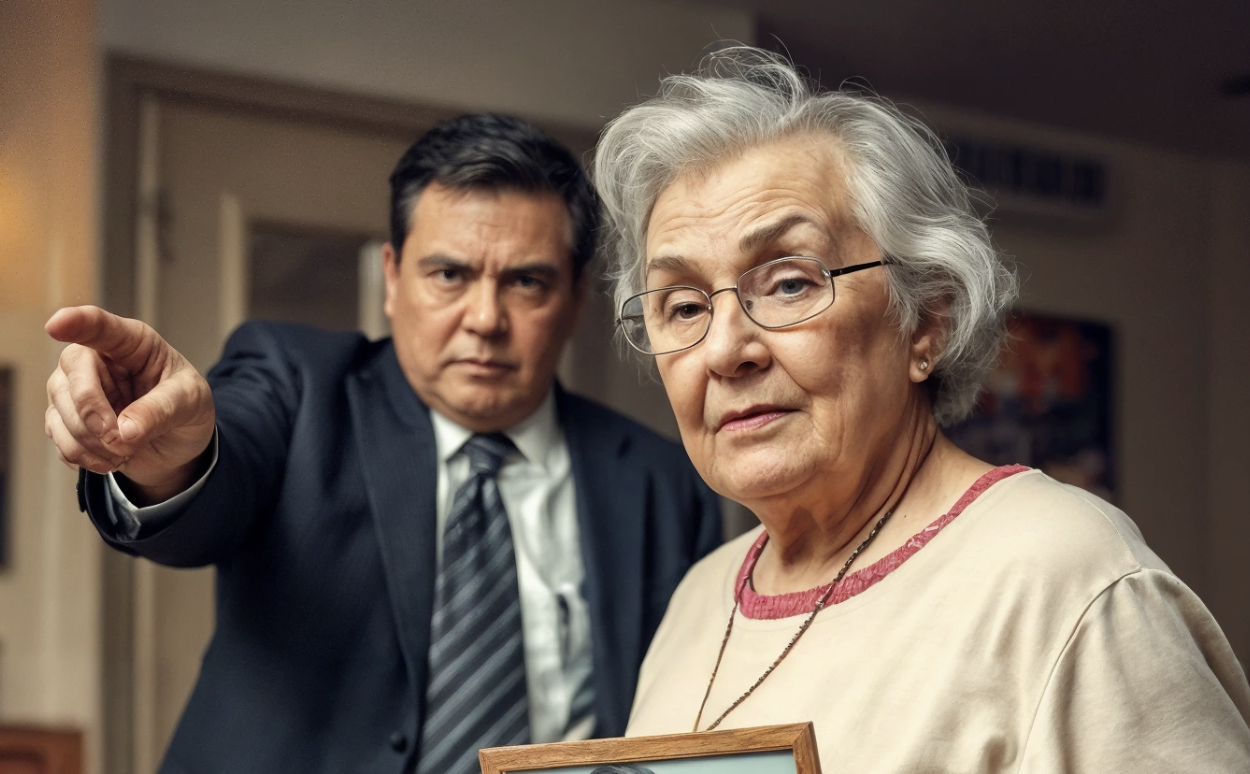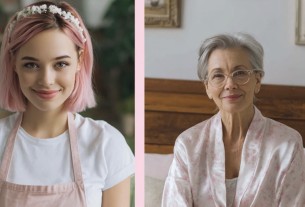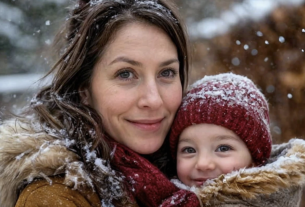The snow was falling in thick, heavy flakes, as if it was trying to cover the earth with a white blanket as quickly as possible. The evening was damp and cold—the sharp wind pushed the snow across the asphalt, and the streetlights only illuminated the nearest steps, while everything else disappeared into the gray mist. People hurried home, hidden beneath hoods and scarves, not noticing each other. The city seemed indifferent, as if deliberately shutting itself off from anything unnecessary.
It was on such an evening that Valentina Ivanovna walked down the avenue.
She appeared to be in her eighties. Stooped, with a thin, almost sharp chin and dull eyes, she moved slowly, taking tiny steps. She wore an old coat, too large for her frail figure, and a dark scarf tightly tied under her chin. Her thin, red fingers, numb from the cold, stuck out from under the sleeves.
In one hand, she held a worn plastic bag, and in the other, a crumpled note. She was carefully reading the house numbers, listening to the street, trying not to miss the right turn. Despite her age and fatigue, her face remained focused. It wasn’t fear or despair, but some important purpose that kept her going.
Finally, the glowing sign of the restaurant appeared before her. The black, curved letters on the light-colored facade stood out against the gray walls of the buildings. Valentina stopped, glanced at the note once more, and nodded to herself: “Here.”
The frost pinched her face, her fingers were numb, but she didn’t hurry to go inside. Her heart was pounding—dull, uneven. Inside, tension was growing: she had come here for a reason, to say something she couldn’t express her whole life.
The heavy glass door opened softly under her palm. Warmth, the scent of wine and roasted meat, and the muffled laughter of the guests greeted her inside. The soft light from the chandeliers created a cozy, intimate atmosphere, and the mirrors gently shimmered in the semi-darkness.
She stood out immediately. Her clothes, her movements, her gaze—everything spoke of her being out of place. At the cloakroom stood a man about forty years old. He cast a quick, contemptuous glance at her and stepped aside, not even hiding his disgust. Valentina didn’t notice him. She confidently headed to the receptionist—a young woman behind a high counter.
“Good evening,” she whispered. “I have a reservation. The name is Valentina Ivanovna. For 7:30 p.m.”
The girl frowned and leaned closer, as if she hadn’t heard.
“Sorry… what did you say?”
“I booked a table through the website. Everything has been paid for in advance.”
The receptionist, Angela, furrowed her brow. Her gaze scanned the woman’s appearance—the weathered face, the worn coat, the trembling hand—and lingered on her face, showing a cold mistrust.
“Are you sure you’re not in the wrong restaurant?” Her voice was sharp, with clear mockery.
“No, I’m not mistaken,” Valentina replied. “There’s a person working here… I just want to have dinner. It’s important.”
The girl signaled to the security guard, who approached.
“Check the reservation,” she said shortly. “This is probably some mistake.”
Valentina handed her the printout. The guard took it and checked it against his tablet. Angela waited with a defiant expression. But he nodded.
“There’s a reservation. Table 12.”
The girl’s face twisted in frustration. She snatched the paper from him.
“This is impossible. Someone must have made the reservation in her name. People like her don’t come here on their own.”
“I paid for it myself,” Valentina said quietly but firmly. “The bank helped me.”
Angela wanted to say something, but Valentina suddenly added:
“I want to speak with the manager.”
These words sounded firmer than expected. The receptionist frowned.
“He’s busy. He’s not here right now.”
“I’ll wait. This can’t wait.”
Angela bit her lip, but with a gesture, she pointed to the stairs.
“Fine. Go up. Just don’t disturb the guests.”
The climb was difficult. The stairs were narrow, and the steps were slippery. Valentina held onto the railing, each movement requiring effort. Her heart was beating unevenly, her head was spinning, but her thoughts were clear: “Only today. Only now. You have to do this.”
When Valentina reached the top of the stairs, the banquet hall opened before her. Spacious, with high ceilings, filled with soft light and the warm shimmer of crystal. Round tables with snow-white tablecloths, sparkling dishes, satisfied guests—some were laughing, others were clinking glasses. Life was bubbling, festive.
She stopped at the threshold, hesitant to take a step. They noticed her. The hall fell silent. Whispers spread through the room. She felt like an outsider. No—an intruder. Like a stain on an expensive dress.
“What’s this circus?” a man in a strict suit called out. “Who let this beggar in?”
It was Sergey Petrovich—an influential and ruthless businessman.
“Get her out of here,” he added. “She’s ruining the atmosphere.”
The crowd picked up the chant. First laughter, then mocking remarks.
“What’s she doing here?”
“Maybe she’ll find some food in the trash?”
“Or will she sing for us? Then we’ll give her some change for a shelter!”
Valentina seemed to shrink inside her coat. She stood by the wall, as though trying to become invisible.
Next to Sergey Petrovich, a woman in an evening gown laughed:
“Maybe she’ll entertain us? Come on, grandma, show us your act!”
The buzz of approval rippled through the room. These weren’t just random words anymore—it had become a deliberate cruelty. Applause, mockery, filthy jokes—all came crashing down on the old woman. She stood there, as if rooted to the floor, unable to move. Her chest felt empty. Everything blurred before her eyes.
“God… why?” she whispered almost inaudibly.
Ira, a young waitress who had been watching from the side, clenched her lips. Without a word, she turned and walked toward the service door. A minute later, a man in a black suit appeared. Tall, confident, with a cold gaze—Oleg Nikolaevich, the manager.
The room went silent. Everyone knew: when he spoke, people listened.
Oleg approached. His gaze lingered on Valentina. It wasn’t malice or irritation—more like confusion. He examined her, like something vaguely familiar but too distant.
“Good evening,” he said evenly. “What’s the matter?”
“This woman is disturbing,” Sergey Petrovich replied. “She’s embarrassing the restaurant. Are we letting beggars in now?”
“I see,” Oleg said briefly and turned to Valentina. “Please, come with me.”
She didn’t resist. Silently, she followed him into a dim corridor. There, he gently closed the door and turned to her.
“You must have made a mistake with the location. I apologize for the behavior of the guests. If you need assistance—I can arrange a taxi or some financial help.”
Valentina raised her head slightly. The pain and bitterness stirred inside her.
“Why would I need compensation?”
“For the discomfort. I understand you might have come here by mistake. But if you need a place or food, I’ll help.”
She swayed back as if those words hit harder than the mockery.
“I didn’t come for that,” she whispered.
“Then explain: why are you here?”
She gathered her strength. Her voice trembled but was firm:
“I… I’m not a stranger. I’m yours…”
“Excuse me?” He furrowed his brow.
“I’m your mother.”
The pause hung thick, like fog. Oleg blinked. A shadow of a smirk crossed his face. He even glanced around, checking if anyone had overheard.
“Is this a joke?”
“No.”
“Listen,” his voice became colder. “If you’re hoping for money or a story—you’ve miscalculated. I’m no fool. And I don’t believe in miracles.”
He signaled to the security guard.
“Take this lady out. She should never come back.”
Valentina didn’t resist. She just stood there, as if everything happening wasn’t happening to her. Inside—emptiness. The guard took her arm—not roughly, but firmly. She walked out. The door closed softly behind her.
Outside, the snow was still falling. White. Indifferent. The wind tickled her face, but she didn’t feel the cold. She took a few steps and sat on a bench at the bus stop. Her fingers trembled. The mittens were somewhere inside. The worn bag lay in her lap. A piece of paper with the address stuck out of her pocket. Now it seemed absurd.
She closed her eyes. Tears ran down her cheeks—icy, slow. From her inner pocket, she pulled out an envelope. Inside— a photograph. Black and white. A six-year-old boy, wearing a ushanka, with a shy smile. Oleg.
“Son…” she whispered.
A gust of wind tore the photo from her hands. She jumped up, caught it. She pressed it back to her chest.
“I won’t leave,” she whispered. “Not until you remember.”
She stayed on the bench. The frost bit her skin, but something stronger burned inside. Pain, guilt, hope—all merged into one stubborn fire.
When the restaurant door opened again, Oleg stepped out. He walked to the car, accompanied by his staff. But suddenly, he heard a call:
“Son! Wait!”
He turned sharply. His face was irritated.
“What now?”
She held out the photo to him. He didn’t immediately understand what it was.
“Look,” Valentina said softly. “Just look.”
Oleg approached. He looked closely. His face froze.
“Where did you get this?”
“It’s you. Six years old. Summer. We lived in the village then. You had a patch on your shirt. Do you remember?”
Oleg was silent. He just looked at the photo. His lips trembled. In his eyes—confusion, fear.
“I have one like that too,” he finally spoke hoarsely.
“I know,” Valentina replied. “Because I’m your mother.”
Silence. Heavy. Oleg stood as if the ground had slipped out from under his feet.
“Are you really…” he didn’t finish.
“Yes. I’m your mother.”
A long pause. Then—a gesture with his hand:
“Let’s go. We’ll talk.”
She didn’t believe it at first. Only a moment later, cautiously, she began to move behind him. Every step felt like the first. Like a step into the life she had lost long ago. But now—maybe—she was trying to get back.
The restaurant was almost empty. They moved to a small room separated from the main area. It was quiet here, no one disturbed them.
Oleg poured tea and carefully pushed the cup toward Valentina. She looked at him, trying not to strain her gaze—afraid to scare away this rare moment.
“Why… now?” he finally asked, almost as if talking to himself. “Why did you come today?”
She sighed deeply, painfully.
“Let me explain. I don’t want to justify myself. I just need to explain.”
He didn’t answer, but he didn’t interrupt her either.
“I was young, foolish… in love. Your father, Oleg… he was a combine driver. Kind, cheerful. We married quickly. And then they took him—first to the army, then to the front. I never saw him again. A letter came in the spring: he died. I was left alone. My mother got sick, died a month later. It was just you and me—two loners. I didn’t understand anything back then… just lived. Worked where I could—sewing, washing floors, cooking.”
She paused, took a sip of tea.
“Then my heart got worse. They said I needed an urgent operation. And you were only three. No family. I begged the neighbors, friends—everyone refused. They said they couldn’t help. I begged. I begged on my knees. No one agreed.”
Oleg was listening, his eyes darkened. He didn’t speak.
“And then I put you in an orphanage. Just for a while. To get treated. To come back. To take you. But by the time I could—I’d gone to get you. It was too late. You were adopted. They didn’t tell me where. The director—a woman without warmth—just told me, ‘It’s too late. He’s gone.'”
Her voice wavered. She put the cup aside.
“After that, another life began. Homelessness. Searching. I went to authorities, wrote letters, traveled to different cities. Sometimes I stayed in church shelters, sometimes at train stations. The photo with us was always with me. It reminded me you were there. That you were alive.”
He sat still. His face tense, his lips tight.
“So here I am,” she whispered. “I’m not asking for forgiveness. I just wanted you to know the truth. So you wouldn’t think I abandoned you. So you’d know: every day, I cursed myself for that decision. And every day, I dreamed of finding you.”
“I was six,” he said finally. “I thought you were dead.”
“I almost died,” she whispered. “But something held me back. I think it was you and our photo.”
“And I…” he swallowed. “I grew up in the orphanage. Then I got into a foster family. Good people… but strangers. They never called me their son. They never hugged me just because.”
“Sorry…”
He was silent.
“I don’t know how to react. This is too much.”
“I understand,” Valentina nodded. “I don’t need forgiveness. I just wanted you to know.”
A long silence. The snow outside was falling harder.
“And all this time… you were looking for me?”
“All this time. Until I met a woman I used to work with. She helped me connect with a foundation. They found out you ran this restaurant. I saw your picture online. And I knew—it was you. My son.”
She raised her eyes, full of tears.
“You’ve grown up. Strong. I’m proud of you, son.”
He closed his eyes. Inside, everything was falling apart and coming together again. Before him stood a woman—from his earliest past. From a world he had long believed didn’t exist.
“I think this is impossible to forgive,” he finally said. “All my childhood, I thought no one needed me. I didn’t know a mother’s care. Not one bedtime story. Not one real hug.”
Valentina lowered her head.
“The foster parents… cold. Everything strict. Discipline. But not love. I never called them mom. Just by their names. Do you understand what that means?”
“I understand,” she whispered.
“And now you’re saying everything wasn’t as bad as I thought. That you suffered. But I suffered too. I was six when you disappeared. I didn’t understand anything. And then I spent my whole life hiding that pain. And now you’re here.”
“I don’t need you to forgive me,” she said softly. “I just want the truth to be between us. I didn’t expect you to hug me. I was afraid to just come close.”
He slowly pushed the cup aside. His fingers trembled.
“And now… where are you living?”
She hesitated.
“In a church shelter. With the mother superior. It’s warm there. Sometimes I work—sew, help with the household. I get by.”
Oleg stood up, walked to the window. He looked outside. Stood there. Turned around:
“I’ll take you.”
She looked at him, surprised.
“You don’t have to… I’ll walk.”
“I insist.”
They drove in silence. He was driving, she was beside him. Neither believed this was happening. But the silence wasn’t empty—it was filled with unspoken words. He had asked for the address. Didn’t say a single word more. But his face clearly showed: he was thinking. A lot. And painfully.
A few days later, Valentina was sitting by the window, as usual. Outside the glass—the winter day, snow, icicles from the eaves. Life seemed the same. But suddenly—there was a knock at the door. Light, cautious.
“Who’s there?” she asked, getting up.
The door opened. He stood in the doorway. In a coat, with a box in his hands. His face—determined and tired.
“I thought… it’s my turn to find you.”
She froze.
“What do you mean?”
“Let’s go. I want you to meet my family.”
He stepped aside. Behind him—the car. Inside—his wife and children. They looked at her curiously. Oleg nodded:
“This is my wife. And these are your grandchildren.”
Valentina pressed her hand to her chest. It seemed like her heart stopped, and then suddenly drove the blood through her body.
A week later, they met again—at the entrance of an old building. Oleg climbed with her to the fifth floor, opened the door to an empty apartment. Light walls, fresh air, a little furniture.
“This is my apartment. I used to rent it out. Now it’s empty. But now—it’s yours. We’ll arrange everything. Clothes, dishes—we’ll buy everything.”
She couldn’t speak. She stood there, holding the keys in her hand.
“Why are you doing this?” she finally spoke.
He shrugged:
“Because you’re my mother. Even though I can hardly believe it.”
She gently took the keys. Tears flowed quietly, as if releasing something inside.
On the windowsill, in a frame, appeared an old photograph. Oleg carefully placed it.
“Let it stay. As a memory. And as a beginning.”
She sat on the edge of the bed. Looking out the window. He stood next to her. Without words. Just next to her.
And that was enough.



